A dispute Redressal mechanism is a structured process that addresses disputes or grievances that arise between two or more parties engaged in business, legal, or societal relationships. ADR refers to any procedure agreed to by the parties of a dispute in which they use the services of a neutral party to assist them in reaching an agreement and avoiding litigation.
Nature
Dispute Redressal Mechanisms are typically non-judicial in nature, which denotes that they are not resolved within the court of law, although the outcome may sometimes be legally binding (e.g., in arbitration).
Constitutional Provisions
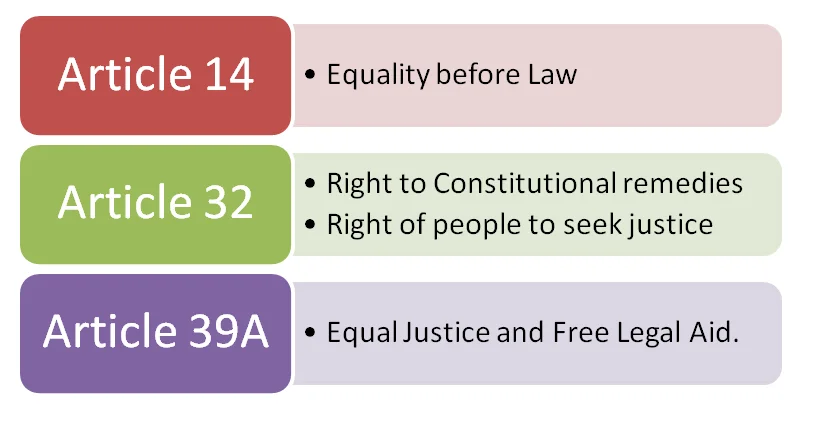
Enroll now for UPSC Online Course
Methods of ADR
Dispute Redressal mechanisms are used in dispute resolution and may incorporate conciliation, conflict resolution, mediation, and negotiation.
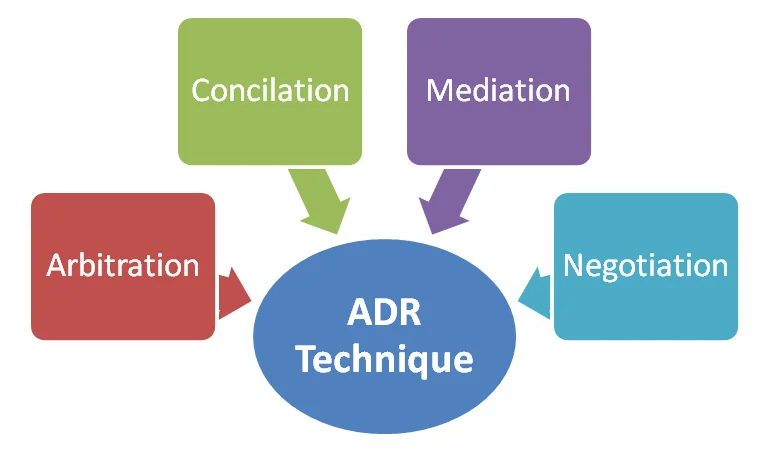
- Arbitration
Arbitration is considered an adjudicatory alternate dispute resolution mechanism in which a neutral third party, known as the arbitrator, decides the dispute on its merits.- Present status: Arbitration is a legally enforceable and binding alternative to traditional court proceedings, though it is not the only enforceable option. Other ADR mechanisms like mediation can also lead to legally binding settlements if agreed upon by the parties.
- Related Statutory Provisions: The Arbitration and Conciliation Act, 1996 consolidated the law related to domestic arbitration, international commercial arbitration, and enforcement of foreign arbitral awards.
- Judicial Intervention: The Act minimizes judicial intervention and provides mechanisms for the removal and replacement of arbitrators.
- Speedy Disposal: The 1996 Act was amended in 2015 and 2019 to ensure the speedy disposal of disputes by arbitral tribunals, encourage institutional arbitration, and ensure fairness in arbitral proceedings.
- Conciliation
Conciliation is a non-adjudicatory alternate dispute resolution mechanism where a neutral third party helps the disputing parties resolve their disputes amicably.- Role of Conciliator: The conciliator plays an active role and may offer suggestions or views to help the parties reach a settlement.
- Related Provisions: In 1980, UNCITRAL framed the Conciliation Rules for resolving international commercial disputes uniformly through conciliation. These rules were adopted by the UN General Assembly, and India, as a signatory, has incorporated them into its domestic legislation.
- Success Story: The Himachal Pradesh High Court initiated a “Conciliation Court” pilot project, successfully referring civil cases to conciliation before trials commenced.
2. Mediation
Mediation is known as third-party facilitated negotiation, where a neutral third party helps disputants come to an amicable settlement.
-
- Role of Mediator: In mediation, the mediator plays a passive role, merely assisting the parties to negotiate and arrive at their own settlement.
- Wider Powers of Conciliator: In India, a conciliator has wider powers than a mediator. While a conciliator can suggest and reformulate settlement terms, the mediator’s role is limited to facilitating the parties’ negotiations.
- Present Status: Court-annexed mediation centres operate in several trial courts across India, such as in Allahabad, Lucknow, Chandigarh, Ahmedabad, Rajkot, Jamnagar, and Surat.
- Statutory Provisions: Several Acts mandate mediation or conciliation before further court proceedings, such as:
- The Hindu Marriage Act, which requires reconciliation efforts before proceeding to trial.
- The Family Courts Act, which encourages mediation and conciliation in matrimonial disputes.
3. Negotiation
Negotiation closely resembles mediation but usually involves the parties themselves settling their disputes without the intervention of a third party.
-
- Limited Role of Third Parties: Even if a negotiator is involved, their role is limited to facilitating communication between the parties.
- Mediation and Negotiation: Both are effective for disputes such as family, neighborhood, matrimonial, and industrial disputes, where continuing relationships are often important.
Platforms for ADR in India
India uses various platforms to facilitate ADR, including Lok Adalats, Permanent Lok Adalats, and Mediation Centres. These platforms provide alternate forums to resolve civil and family disputes efficiently.
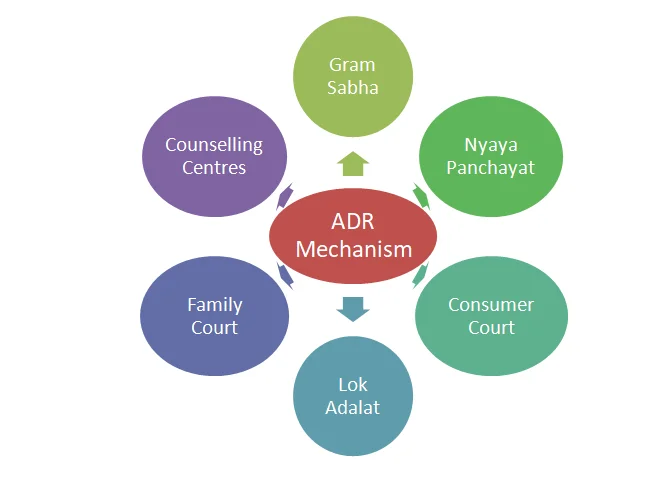
Arbitration and Conciliation (Amendment) Act, 2021
This Act aims to prevent misuse by “fly-by-night operators” who exploit the law to secure fraudulent awards.
Key Features
- Qualifications of Arbitrators: The Amendment removed the arbitrator qualifications under the 8th Schedule of the 1996 Act. These qualifications will now be prescribed by regulations framed by the Arbitration Council of India (ACI), allowing for more flexibility in arbitrator appointments.
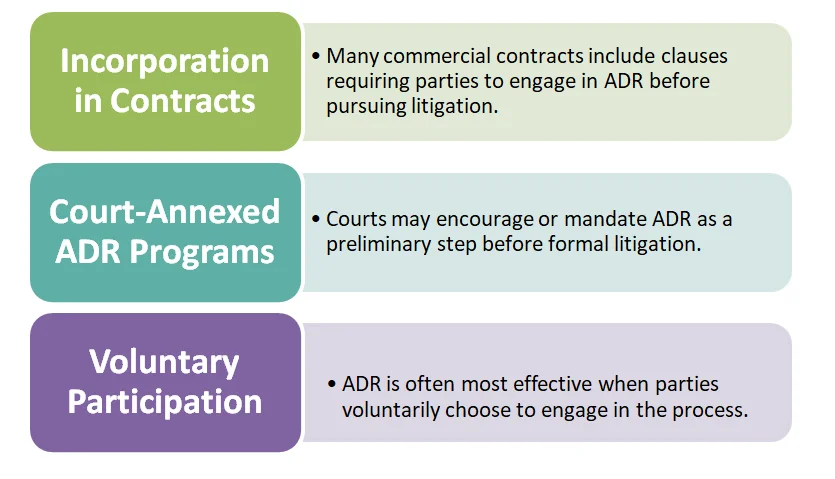
- Unconditional Stay on Awards: If an award is found to be based on fraud or corruption, the court can grant an unconditional stay while an appeal under Section 34 of the Arbitration Act is pending. This prevents the enforcement of fraudulent awards.
- Retrospective Application: The Amendment applies retrospectively from 2015, meaning that awards granted under fraudulent conditions since then can be stayed.
Impact on Dispute Resolution
- Checks on Fraud: The Act helps to prevent fraud and corruption in arbitration, ensuring that awards are fair and legitimate.
- Promotion of India as a Hub: By removing the strict qualification requirements from the 8th Schedule, the Act promotes India as a global commercial arbitration hub, attracting eminent arbitrators to the country.
Issues with the Proposed Amendment
- Role of Losing Party: The Amendment introduces concerns that a losing party may allege corruption or fraud to prolong litigation, as courts can now stay awards unconditionally during appeal processes.
- Retrospective Application: The retrospective nature of the Amendment may open the floodgates for new litigation, potentially affecting the enforcement of international contracts and harming India’s ease of doing business.
- Unclear Definitions: The Act does not clearly define fraud or corruption, which may cause ambiguity in legal proceedings.
Advantages of ADR
As per the 222nd Law Commission Report, the benefits of ADR include
- Less Expensive: ADR is more cost-effective than litigation.
- Less Time-consuming: ADR processes, especially arbitration, are faster since there are no lengthy appeals.
- Free from Technicalities: ADR offers flexibility, allowing parties to design procedures to fit their needs.
- Confidentiality: Parties can discuss disputes without fear of public disclosure.
- Continuing Relationships: Unlike litigation, which can create adversarial relationships, ADR fosters reconciliation, preserving goodwill between parties.
- Improved Enforcement: ADR helps improve the speed of contract enforcement, which is crucial for doing business, as noted by the World Bank’s Ease of Doing Business reports.
- Saving Forex Reserves: By resolving disputes domestically through arbitration, India saves significant amounts of foreign exchange that would otherwise be spent in international arbitration hubs like Singapore.
Limitations of ADR
Lack of Awareness: Many people, including legal professionals, are unaware of ADR mandates and its processes.
- Good Faith Required: ADR’s success hinges on the good faith of the parties involved, making it difficult to resolve disputes if trust is lacking.
- Skepticism: Many litigants remain skeptical of ADR, opting to pursue formal court proceedings if dissatisfied with the result.
- Voluntary Process: ADR cannot force parties to resolve disputes without mutual consent. Without an agreement, parties cannot be compelled to use ADR mechanisms.
- Forcible Transfers: In some cases, courts might refer disputes to ADR even if one party is unwilling, which can lead to dissatisfaction.
- Neutral Arbitrator Bias: Losing parties often claim that the arbitrator was biased, undermining confidence in the ADR process.
- Limited Scope: ADR typically resolves civil or monetary disputes but cannot issue injunctive orders or deal with serious criminal cases.
- No Appeal: Decisions made through arbitration cannot be appealed, unlike in formal courts.
Challenges and Considerations
Enforceability of Agreements: Ensuring that agreements reached through ADR are legally binding is a critical challenge.
- Power Imbalance: ADR may not be effective in cases where there is a significant power imbalance between the parties.
- Training and Qualifications: The effectiveness of ADR depends heavily on the competence and training of arbitrators, mediators, and conciliators.
Way Forward
- Speedy and Successful ADR: Using tools like e-Lok Adalat and expanding the scope of pre-litigation mediation can build litigants’ trust in ADR mechanisms.
- Promote ADR as a Career: There is a need to create a cadre of well-trained arbitrators and mediators by setting quality control standards and ensuring ethical conduct.
- Reducing Judicial Pendency: Since governments are involved in a significant portion of pending cases, opting for ADR can reduce court backlogs.
- Coordinated Efforts: Collaboration between the judiciary, government, and legal professionals is essential to create a robust ADR ecosystem.
- Expand Scope: Arbitration and mediation centres should be established to address non-commercial disputes as well.
- Attitudinal Change: Building public confidence in ADR as a legitimate and trustworthy option for dispute resolution is key.
- Other Measures: Improving infrastructure, skilling lawyers in ADR, and providing the necessary manpower are essential steps for promoting ADR.
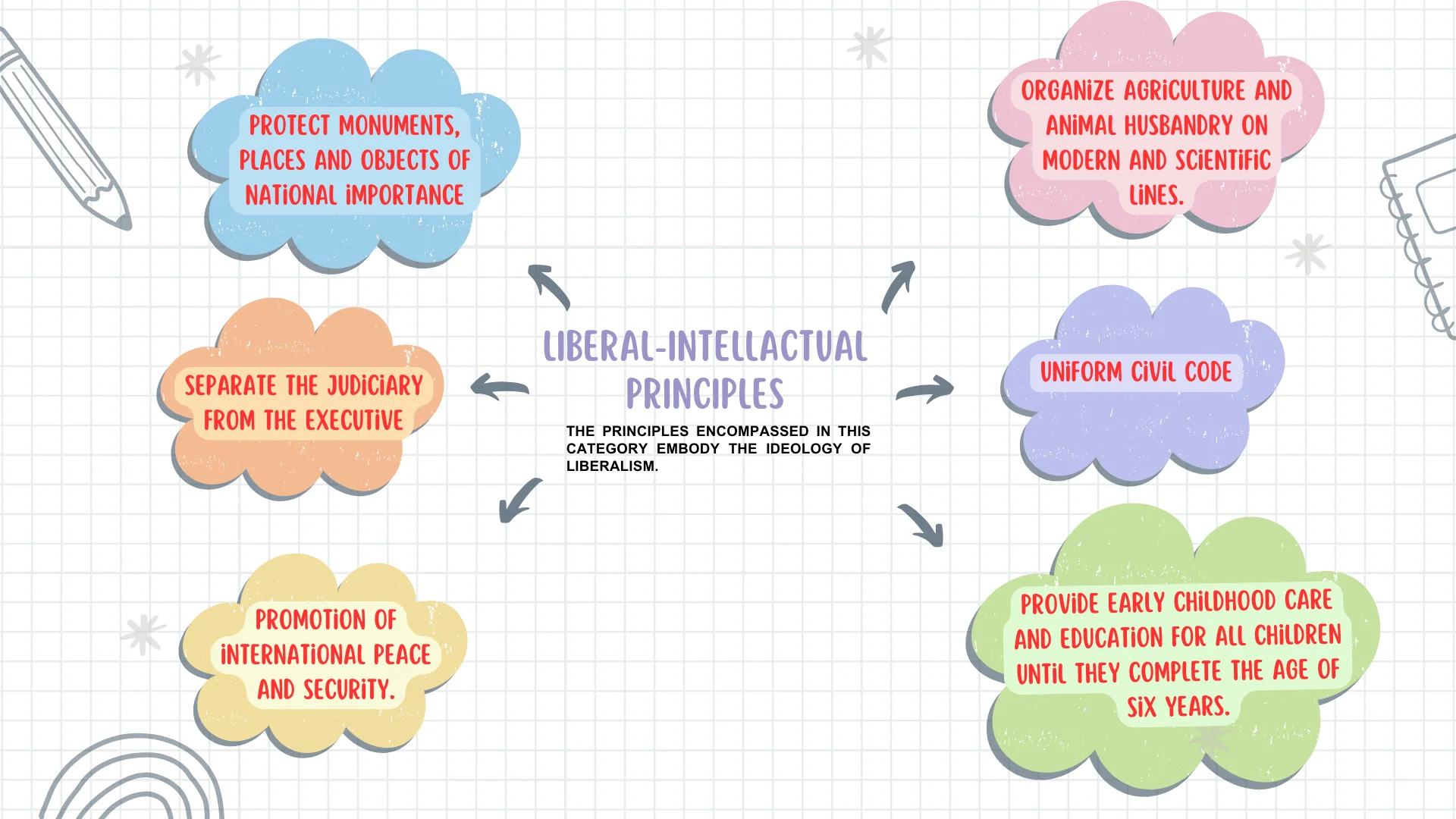
Enroll now for UPSC Online Course
| Must Read | |
| Current Affairs | Editorial Analysis |
| Upsc Notes | Upsc Blogs |
| NCERT Notes | Free Main Answer Writing |
Conclusion
ADR plays a crucial role in resolving disputes efficiently and cost-effectively, reducing the burden on courts while maintaining relationships. For ADR to fully realize its potential, greater awareness, improved training, and better legal frameworks are essential.
Sign up for the PWOnlyIAS Online Course by Physics Wallah and start your journey to IAS success today!
| Related Articles | |
| World Bank | Lok Adalats |
| UNGA’s 78th Session | Alternative Dispute Resolution (ADR)Sustainability |

 GS Foundation
GS Foundation Optional Course
Optional Course Combo Courses
Combo Courses Degree Program
Degree Program










